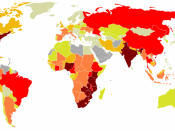All human beings are born free and equal in dignity and rights.
Article 1, The Universal Declaration of Human Rights
Humanity is yet to face a global epidemic of HIV/AIDS
if it fails to join efforts against the disease
Lars O. Kallings, the UN Secretary General's Special
Envoy for HIV/AIDS in Eastern Europe.
We are all born equal in dignity and rights áV at least this is what we believe in. How come our "equality" remains mainly on the paper? How come some people enjoy all the benefits of modern life and the latest achievements of the science, while others are obliged to live in hunger, poverty, homelessness, discrimination, and to be exposed to inadequate health care? Are the changes a human body (and sometimes mentality) undergoes during the life to be blamed? If yes, why? If no, what or who is to be blamed then?
While I am not going to answer all those questions above, my main task is to focus on the example of the attitude of health-care providers towards high-risk patients; in particular, patients with HIV/AIDS.
To my attention came a case of a young pregnant woman, who was denied access to both state and private health care institutions in the Republic of Georgia. I would like to analyze this case from the perspective of both national and international health laws showing how the decisions of those health institutions conflict with the ethics and laws.
Let us first listen to the person whose problem is to be examined. She is a 28 year old Georgian woman, who had not been informed about her positive HIV status until the late stage of pregnancy. In the interview with a medical doctor from AIDS and Clinical Immunology Research Center of Georgia she said:
The fact that my husband...


